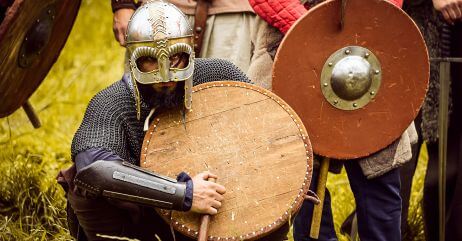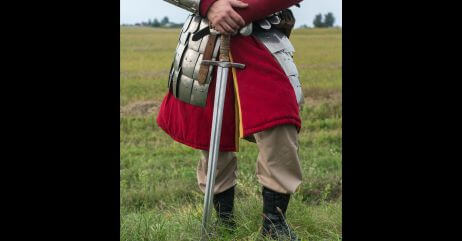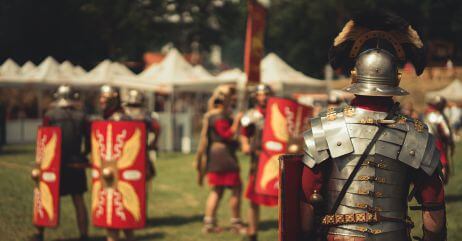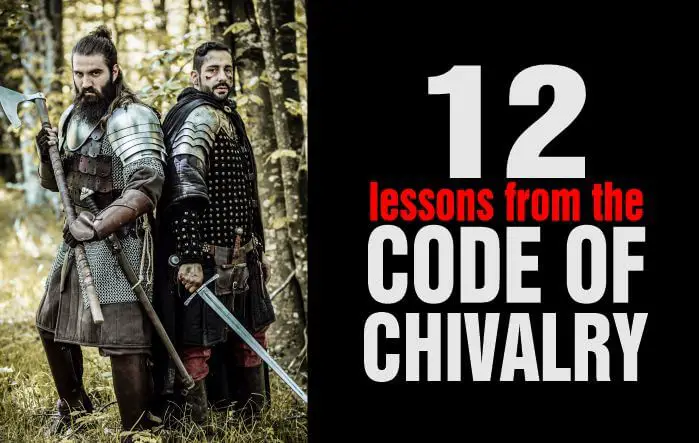What does the code of chivalry teach? These 12 lessons from the Knights’ Code of Chivalry from the past will change your perspective on life.
The code of chivalry was effective as far back as the 1490s but its principles are as relevant and timeless as ever in our modern world.
Anchored in the medieval era, chivalry was more than a mere code of conduct; it was a way of life dressed in honor, courage, and virtue.
As we examine these 12 valuable lessons, we’ll discover how the chivalric code transcends ages, inspiring us to uphold ideals such as integrity, compassion, and justice.
You might want to check out the history of chivalry here.
Relevance of Chivalry and its Impact on Contemporary Values
The relevance of chivalry in modern times cannot be overemphasized, even though majority don’t value it.
The relevance of chivalry lies in its enduring impact on contemporary values, transcending time and societal changes.
While originating in medieval times as a code of conduct for knights, its underlying principles have remained pertinent, shaping modern character and ethics.
Chivalry’s emphasis on honor, integrity, and respect continues to inspire individuals to uphold these virtues in their personal and professional lives.
It promotes a sense of responsibility towards others, encouraging acts of kindness, compassion, and empathy.
In the modern world, chivalry serves as a reminder of the importance of treating others with dignity and courtesy.
Its influence extends beyond traditional gender roles, emphasizing the significance of fairness and equality in all interactions.
Of course, the timeless relevance of chivalry lies in its ability to cultivate virtuous character and guide individuals to make ethical choices that promote harmony and unity in our modern world.
Related: Reasons they Say Chivalry is No More
12 Lessons from the Knights’ Code of Chivalry

Though there are many lessons that could be drawn from the code of chivalry, these 12 stand out and can be adopted by anyone who desires to contribute to making society a better place for all.
Here we go…
Lesson 1: Courage and Bravery are Rewarded
We learn a lot from the medieval Knights and the reward of courage and bravery are at the forefront.
Courage and bravery and its reward as lessons from the knights’ code of chivalry, reflect the essence of a noble character.
The benefits of living a life of courage and bravery are immeasurable, likewise the penalties for not being brave.
There is no way you can hide from either divide unless you choose to live away from society, which in itself is a consequence.
A lot has been written about being courageous and brave, but the lessons we learn from the Knights and their code of conduct are timeless.
Related: Essential Chivalrous Moves for Modern Society
Knights of old were renowned for their resilient valour in the face of danger, defending the weak and upholding justice.
This virtue towers above physical bravery, pushing the moral courage to stand for what is right, even in difficult times.
Courage on its own is a rare quality that eludes many in modern times.
You hardly see people enduring and standing their ground in the face of intimidation or uncertainties.
But the few that do gain the respect of society and are an inspiration to others.
They experience the glory, and hero’s reputation, are open to opportunities, and live a fulfilled life.
That is why in recent times, courage and bravery remain timeless virtues, inspiring individuals to face life’s trials with resilience and determination.
Embracing this lesson from the knights’ code of chivalry, you can become an agent of courage, instilling hope and inspiring others to rise above challenges with valour and honour.
Lesson 2: Honour and Prestige Accompany Genuine Chivalry
Honour and prestige are among the coveted rewards that accompany genuine chivalry, bestowed upon those who adopt the noble virtues of the chivalric code.
As knights upheld their oaths and displayed unmatched courage, their peers and society recognized and celebrated their honourable actions.
Honour, earned through virtuous behaviour and moral fortitude, establishes an individual’s reputation as one of integrity and trustworthiness, garnering respect and admiration from others.
Prestige, on the other hand, is the result of exceptional achievements and acts of valour, setting chivalrous individuals apart as exemplary figures.
Related: Reasons to Believe Chivalry is Alive
Through their selfless deeds and dedication to the well-being of others, they gain distinction and recognition in their communities and beyond.
Such prestige opens doors to leadership roles, promoting a culture of respect and influence, and enabling chivalrous individuals to make a significant positive impact on society.
Sure! Embracing genuine chivalry, individuals not only cultivate their own honour and prestige but also inspire others to follow in their footsteps, perpetuating a legacy of noble character and virtuous conduct.

Lesson 3: Respect and Courtesy are not Weaknesses
Modern society ascribes weakness to acts of respect and courtesy especially when displayed by a true gentleman.
Respect and courtesy, are strong lessons from the knights’ code of chivalry, but it’s unfortunate how they are often misunderstood as signs of weakness or subservience.
Knights understood that treating others with respect and displaying courtesy were reflections of their own inner strength and character.
It showcased their ability to rise above ego and arrogance, embracing humility and empathy.
In a society where aggression and dominance can be mistaken for power and masculinity, the code of chivalry reminds us that true strength lies in showing compassion and understanding towards others.
Respect and courtesy promote genuine connections, build trust, and create an atmosphere of mutual appreciation.
Knights demonstrated that honouring the dignity of others through respectful and courteous behavior was not a sign of vulnerability but a testament to their noble character.
Embracing this lesson from the knights’ code of chivalry in the modern world allows us to exemplify true strength and leadership, inspiring a culture of empathy, kindness, and harmonious relationships.
Related: The Risky Romance of Medieval Knights and Ladies
Lesson 4: Loyalty and Devotion – the Anvil where Relationships and Friendships Are Forged
Loyalty and devotion, as lessons from the code of chivalry, serve as the anvil where enduring relationships and friendships are forged.
In the medieval era, knights demonstrated unalloyed loyalty to their lords and causes, and their commitment was the foundation of their honor and valor.
These virtues extended beyond battlefield allegiances, stretching to friendships and personal bonds.
Like a blacksmith’s anvil, loyalty and devotion withstand the tests of time, forging lasting connections built on trust, support, and unshakable dedication.
In modern relationships, these virtues remain as vital as ever.
When you prioritize loyalty, you stand by loved ones in triumphs and trials, providing a secure haven of support.
Devotion deepens connections, inspiring us to be selfless in our care and unwavering in our commitment.
By embracing these lessons from the code of chivalry, we create relationships that withstand challenges and strengthen with each passing day, nurturing an anvil of trust and love upon which lasting bonds are forged.
Related: Rules of Medieval Courtly Romance
Lesson 5: Compassion and Empathy – a Reminder that We are Humans and Need One Another
Compassion and empathy are profound lessons from the code of chivalry, serving as reminders that we are all humans in need of one another’s support and understanding.
Knights understood that beneath armour and titles, they were individuals with shared vulnerabilities and emotions.
Embracing compassion allowed them to extend a helping hand to those in need, recognizing the interconnectedness of humanity.
Empathy, too, was a powerful virtue that enabled knights to put themselves in other people’s shoes, understanding their struggles and joys.
By doing so, they formed deep connections, united by shared experiences and emotions.
In our modern world, these lessons from chivalry hold great significance.
Compassion and empathy inspire us to show kindness and lend a listening ear to those around us, creating a compassionate and inclusive society.
Through these virtues, we break down walls of division and build bridges of understanding, strengthening our collective bonds as humans.
Compassion and empathy reinforce the age-old truth that we are all in this together, and by supporting one another, we create a world of shared compassion and mutual care.

Lesson 6: Justice and Fairness – the Prerequisite for Peace and the Antidotes to Chaos and Conflicts
Justice and fairness, as lessons from the code of chivalry, are the cornerstones of a peaceful and harmonious society.
Knights understood that upholding these virtues was crucial in maintaining order and preventing chaos and conflicts.
Justice ensures that wrongs are righted and that individuals are held accountable for their actions, instituting a sense of security and trust in the community.
Fairness, on the other hand, promotes equality and impartiality, treating all individuals with respect and dignity.
With fairness on the front burner, knights sought to bridge divides and create a sense of unity among people of different backgrounds and beliefs.
In the modern world, these lessons remain as relevant as ever.
Justice and fairness serve as powerful antidotes to societal discord and division, paving the way for cooperation and understanding.
When these virtues are embraced, we can have an environment where conflicts are resolved through dialogue, and where peace prevails over strife.
Justice and fairness remind us that a just and equitable society is the foundation for a better world for all.
Lesson 7: Humility and Gratitude – The Secret to Knowledge and a Happy Life
Humility is less focused on the self, characterized by a secure sense of self and increased value for people.
Gratitude is having a sense of benefiting from the effort of another.
Both qualities reflect a very humble personality like the medieval knights.
Humility and gratitude, as lessons from the code of chivalry, hold the key to both knowledge and a happy life.
Knights understood that genuine learning is born out of humility, acknowledging that there is always more to discover and that true wisdom comes from a receptive mind.
Through humility, they sought to learn from others and grow in wisdom and understanding.
Additionally, gratitude was a virtue that kept knights grounded in the present, appreciating the blessings and lessons life offered.
By being thankful for even the smallest gestures, knights found contentment and joy in their pursuits.
In the modern context, humility and gratitude remain potent lessons.
Embracing humility gives way to a lifelong thirst for knowledge, empowering us to continuously learn and evolve.
Gratitude, in turn, nurtures happiness, allowing us to find joy in the present moment and cherish the people and experiences that enrich our lives.
Practicing these virtues unlock the secrets to knowledge and cultivates a truly fulfilled and contented existence.
Lesson 8: Self-Discipline and Self-Mastery – The Key to Emotional Regulation and Adaptability
Self-discipline and self-mastery are essential qualities for emotional regulation and adaptability.
Self-discipline refers to the ability to control impulses and stay committed to personal goals, while self-mastery involves understanding one’s emotions and maintaining inner balance.
These attributes enable individuals to respond thoughtfully to challenging situations and navigate through life’s ups and downs.
Drawing lessons from the code of chivalry, knights exemplified these traits.
They regulated their emotions in the face of adversity, channeling courage and composure to uphold their values.
In the midst of chaos, chivalry demanded adaptability, enabling knights to adjust their strategies and remain resilient.
Emotional regulation and adaptability, thus, parallel the core principles of chivalry.
By practicing self-discipline, individuals learn to manage their emotional responses, honing emotional intelligence and empathy.
Self-mastery allows for a deeper understanding of oneself, forging a greater ability to adapt to diverse circumstances and emerge stronger from challenges.
Embracing these virtues, like the knights of old, empowers you to lead a balanced life and inspire others through your actions.
Lesson 9: Generosity and Philanthropy – Giving Back to Society and Display of Love for Humanity
Generosity and philanthropy, as exemplified by medieval knights in their chivalry, are powerful displays of giving back to society and showcasing love for humanity.
Knights, bound by a code of honor, were known for their noble acts of charity and selflessness.
They shared their wealth and resources with those in need, supporting the less fortunate and promoting the welfare of their communities.
In times of war and peace, knights practiced generousity by assisting the vulnerable, protecting the innocent, and aiding those facing adversity.
Their acts of philanthropy extended beyond material offerings, as they often devoted their time and skills to charitable endeavours.
Today, we can draw valuable lessons from the knights’ chivalrous ways.
Embracing generousity and philanthropy allows us to make a positive impact on society, uplift the disadvantaged, and address pressing global challenges.
By displaying love for humanity through selfless actions, we can inspire others to join in creating a compassionate and caring world, mirroring the virtuous spirit of medieval knights.
Lesson 10: Wisdom and Knowledge – The Bedrock of Living
Wisdom and knowledge are the bedrock of living, as demonstrated by the knight’s code of chivalry.
Knights embodied not only physical prowess but also mental acuity and scholarly pursuits.
Wisdom, in this context, refers to the ability to discern right from wrong, make sound judgments, and uphold moral principles.
Knights dedicated themselves to a lifelong pursuit of knowledge, not only in combat and strategy but also in matters of ethics, arts, and literature.
They sought to cultivate their intellect through reading, learning from mentors, and engaging in philosophical discussions.
With wisdom and knowledge as their guiding compass, knights made informed decisions on and off the battlefield, striving for justice, compassion, and humility.
Their dedication to continuous learning and thoughtful application of wisdom enabled them to inspire others, lead with integrity, and protect the weak.
Today, the knight’s code of chivalry serves as a timeless reminder that wisdom and knowledge are essential elements of a just and honourable society, guiding us towards a path of righteousness and personal and collective growth.
Lesson 11: Perseverance and Resilience – The Unbreakable Spirit
Perseverance and resilience, often referred to as the unbreakable spirit, were exemplified by knights and are timeless lessons derived from the code of chivalry.
The life of a knight was filled with challenges and adversities, from perilous battles to arduous quests.
Despite facing overwhelming odds, knights demonstrated perseverance in their commitment to honour and duty.
In the face of defeats and setbacks, knights exhibited remarkable resilience, rising from their falls, learning from their mistakes, and continuing their noble pursuit with renewed determination.
They believed that adversity was an opportunity for growth, and they embraced challenges with courage and grace.
The code of chivalry instilled the belief that one’s character was forged through the trials of life, and the unbreakable spirit of perseverance and resilience was essential for upholding the principles of honour, compassion, and justice.
Today, the legacy of knights serves as a powerful reminder that cultivating perseverance and resilience allows us to overcome obstacles, grow stronger in character, and maintain our integrity in the face of adversity, guiding us to lead honorable and purposeful lives.
Lesson 12: Embracing Modern Chivalry – Chivalry is Dynamic, Can Apply in Any Era
Chivalry, though historically associated with medieval knights, is a dynamic code of conduct that can apply in any era.
At its core, chivalry embodies virtues such as honor, courage, integrity, and compassion.
While the specific practices and contexts may change over time, the underlying principles remain relevant and adaptable.
In modern times, chivalry translates into treating others with respect, standing up for what is right, showing kindness, and valuing empathy.
It encourages us to act with dignity, humility, and a sense of responsibility towards others.
A valuable lesson from the code of chivalry is the importance of serving a higher purpose.
Knights were driven by a commitment to defend the weak, protect the innocent, and uphold justice.
This teaches us that our actions should not solely benefit ourselves but should contribute positively to the well-being of others and society as a whole.
Embracing the spirit of chivalry allows us to sustain a more compassionate and principled world, making it relevant and meaningful in any era.
Conclusion
As we conclude this list of the 12 timeless lessons from the code of chivalry, it becomes evident that the principles upheld by medieval knights continue to hold immense significance in our times.
The virtues of honor, courage, and compassion guide us towards a path of selflessness, empathy, and resilience.
Embracing the spirit of chivalry enables us to navigate life’s challenges with integrity and grace, promoting a more compassionate and just society.
These enduring lessons inspire us to be better individuals, to stand up for what is right, and to extend a helping hand to those in need.
Let us carry forward the legacy of chivalry, infusing our lives with its noble ideals and creating a lasting impact on the world around us.
Frequently Asked Questions
What was the moral of knights?
The moral of knights was to uphold virtues of honour, loyalty, and service to others, particularly the weak and defenseless. They were bound by the Code of Chivalry, emphasizing courage, justice, and compassion. Living by these principles defined their character and nobility in medieval society.
What are 3 examples from the code of chivalry?
- Upholding Honor: Knights were to keep their word, act with integrity, and defend their honor and that of their liege.
- Protecting the Weak: Knights were obligated to protect the innocent, the weak, and those unable to defend themselves.
- Demonstrating Courage: Knights were expected to face adversity with bravery and courage, never shying away from challenges.
What are the key points of chivalry?
The key points of chivalry include courage and bravery, honour and integrity, loyalty and allegiance to one’s lord or king, justice and fairness, mercy and compassion, respect and courtesy towards others, humility and modesty, and the defense of the Christian faith.
What happens if a knight broke the code of chivalry?
If a knight broke the Code of Chivalry, they risked losing their reputation and honour in the eyes of their peers and their lord. Depending on the severity of the transgression, a knight could face punishments or be ostracized from the knightly community, leading to social and professional consequences in medieval society.
References:
https://castrumtocastle.com/blogs/knights-code-of-chivalry/
Pyo Merez is a men’s lifestyle enthusiast and writer about the gentleman’s place and impact on society. Raised by a distinguished gentleman dad, he offers unique insights into how the mind of a gentleman works and how societal norms shape gentlemen’s identity and vice versa.
Through his insightful articles, Pyo taps into the depths of gentleman culture to provide perspectives on etiquette and manners in modern society.

